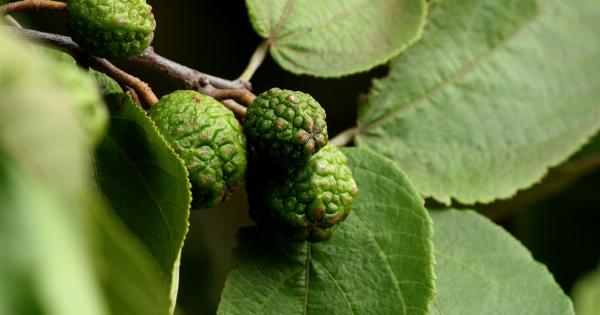Headaches can be debilitating, affecting our ability to concentrate, work, and enjoy life to the fullest.
While there are numerous over-the-counter and prescription medications available to treat head pain, some people prefer natural remedies to manage their symptoms. One such natural remedy is using nuts to alleviate head pain. Nuts are not only delicious and nutritious but also rich in compounds that may help reduce inflammation and promote better brain health.
In this article, we will explore various ways nuts can be incorporated into your diet to help alleviate head pain.
1. Walnuts: Nature’s Pain Relievers
Walnuts are a fantastic choice when it comes to relieving head pain naturally. They are an excellent source of omega-3 fatty acids, which have anti-inflammatory properties that can potentially reduce the intensity and frequency of headaches.
In addition, walnuts also contain magnesium, a mineral that plays a crucial role in preventing migraines and tension headaches. Incorporate walnuts into your diet by snacking on a handful of them daily or adding them to salads, oatmeal, or baked goods.
2. Almonds: A Versatile Nut for Headache Relief
Almonds are another nut that holds great potential in alleviating head pain. They are packed with magnesium, which can help relax blood vessels and prevent migraines.
Almonds also contain salicin, a compound that acts as a natural pain reliever, similar to aspirin. This makes them an ideal snack for those suffering from headaches or migraines. Enjoy almonds roasted as a snack, spread almond butter on whole wheat toast, or incorporate them into your favorite recipes for added relief.
3. Cashews: Nutritional Powerhouses
Cashews are a delicious and versatile nut that can aid in relieving head pain. They are an excellent source of magnesium, which helps relax blood vessels and reduces the frequency and intensity of migraines.
Cashews are also rich in vitamin B2 (riboflavin), a nutrient that studies have shown can help prevent headaches. Snack on cashews throughout the day or sprinkle them on salads, stir-fries, or yogurt to reap their headache-alleviating benefits.
4. Pecans: Natural Anti-Inflammatories
Pecans are not only tasty but also possess anti-inflammatory properties that may help reduce head pain. Inflammation plays a key role in various types of headaches, including migraines.
Pecans contain magnesium, which can help relax blood vessels and prevent migraines. Additionally, pecans are rich in antioxidants, which can neutralize free radicals and reduce oxidative stress in the brain.
Add pecans to your diet by enjoying them as a snack or incorporating them into your favorite recipes for an added anti-inflammatory boost.
5. Brazil Nuts: Selenium Superstars
Brazil nuts are an excellent source of selenium, a mineral that can help reduce inflammation and oxidative stress in the body. Chronic inflammation and oxidative stress are often associated with headaches and migraines.
Including Brazil nuts in your diet can potentially alleviate head pain and promote overall brain health. However, it’s important to consume them in moderation due to their high selenium content. Enjoy a few Brazil nuts as a snack or chop them up and add them to your granola or trail mix.
6. Hazelnuts: A Delicious Source of Vitamin E
Hazelnuts are not only flavorful but also a great source of vitamin E, an antioxidant that helps reduce inflammation in the body. Inflammation can contribute to headaches and migraines, making hazelnuts a beneficial addition to your diet.
Enjoy hazelnuts as a snack, use them in baking, or sprinkle them on top of salads for a tasty and headache-soothing crunch.
7. Pistachios: Nutrient-Rich Headache Fighters
Pistachios are not only fun to eat but also packed with beneficial nutrients that can help alleviate head pain.
They are an excellent source of vitamin B6, which plays a crucial role in brain health and the production of neurotransmitters that regulate pain. Pistachios also contain potassium, a mineral that helps regulate blood pressure and prevent headaches. Incorporate pistachios into your diet by enjoying them as a snack or adding them to salads, yogurt, or smoothies for an extra nutritional boost.
8. Macadamia Nuts: Omega-7 Powerhouses
Macadamia nuts are rich in omega-7 fatty acids, a unique type of monounsaturated fat that has been linked to reduced inflammation and improved brain health.
While research specifically on macadamia nuts and headaches is limited, incorporating them into your diet may have potential benefits. Enjoy macadamia nuts on their own, use them in baking, or sprinkle them on top of your favorite dishes for added flavor and potential headache relief.
9. Mixed Nuts: A Combination Approach
Combining different types of nuts can create a powerful blend of headache-fighting nutrients. Consider creating your own mix of nuts, including walnuts, almonds, cashews, pecans, Brazil nuts, hazelnuts, pistachios, and macadamia nuts.
This mixed nut approach ensures a variety of antioxidants, vitamins, minerals, and fatty acids that can work synergistically to alleviate head pain. Store your nut mix in airtight containers for a convenient and healthy snack option.
10. Nut Butter Delights
If you prefer creamy nutty goodness, nut butter can be an excellent way to incorporate nuts into your diet for headache relief.
Whether it’s almond butter, cashew butter, or peanut butter, ensure you choose a natural and unsweetened version to avoid unnecessary additives. Spread nut butter on whole grain bread, drizzle it over fruit, or add a dollop to your smoothies for a nutritious and headache-soothing treat.






























